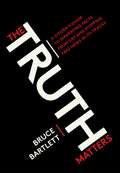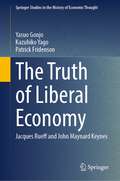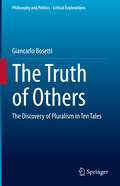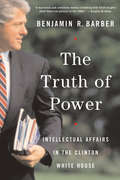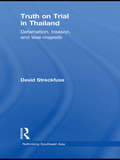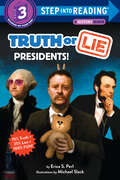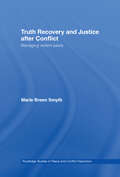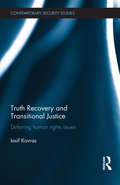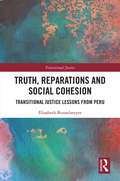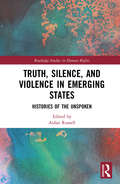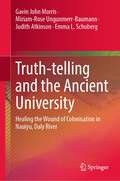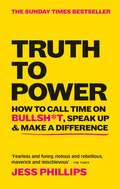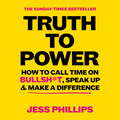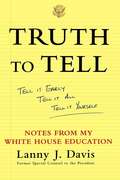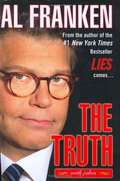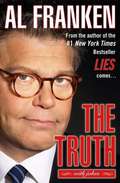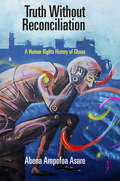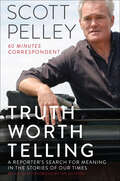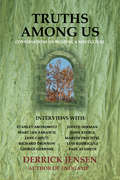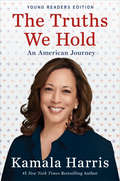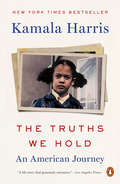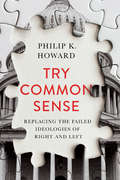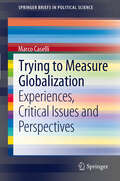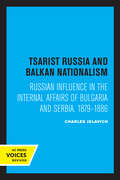- Table View
- List View
The Truth Matters: A Citizen's Guide to Separating Facts from Lies and Stopping Fake News in Its Tracks
by Bruce BartlettDistinguish fake news from reliable journalism with this clear and concise handbook by New York Times best-selling author Bruce Bartlett.Today’s media and political landscapes are littered with untrustworthy sources and the dangerous concept of “fake news.” This accessible guide helps you fight this deeply troubling trend and ensure that truth is not a permanent casualty. Written by Capitol Hill veteran and author Bruce Bartlett, The Truth Matters presents actionable tips and tricks for reading critically, judging sources, using fact-checking sites, avoiding confirmation bias, identifying trustworthy experts, and more.
The Truth of Liberal Economy: Jacques Rueff and John Maynard Keynes (Springer Studies in the History of Economic Thought)
by Yasuo Gonjo Kazuhiko Yago Patrick FridensonThis book provides historical, theoretical, and biographical perspectives on two giants of contemporary economics, Jacques Rueff (1896-1978) and John Maynard Keynes (1883-1946). The former French bureaucrat and academician championed classical economics; the latter British economist founded macro-economics criticizing the classical school. Depending upon archival sources, including personal correspondences between the above two figures, the book describes furious debates between them and surrounding them.In fact, the two economists proposed contrasting diagnosis over almost every event in contemporary world economy: the reparations problem, the Great Depression, the gold exchange standard, and the Bretton Wood System. Keynes appraised managed currency to cope with unemployment, criticizing the classical gold standard; Rueff believed the function of market mechanism, blaming the state intervention. The book highlights deep influence of Rueff, rather larger than Keynes, in Europe before and after WWII.The perspective of the book reaches today’s economic issues. The classical view of Rueff was shared in Mont Pelerin Society, a cradle of neo-liberalism. Rueff’s market-friendly view paved way to the neo-liberal reforms which took place after the 1980s. The classical market theory of Rueff, together with dialogues with the labor unions, prepared the social background of the European Union. This book thus reveals the truth of liberal economy, from the 20th to 21st centuries.
The Truth of Others: The Discovery of Pluralism in Ten Tales (Philosophy and Politics - Critical Explorations #25)
by Giancarlo BosettiThis book offers an account of ten crucial moments in the history of ideas, which represent ten key moments of the discovery of pluralism. From the Indian emperor Ashoka to Origen and from Nicola Cusano to Las Casas, Montaigne, Lessing, giants who opened the way to the thought of tolerance, challenging the dogma of a unique truth dictated by authority, followed in this reconstruction by other glowing thinkers of the twentieth century, such as Horace Kallen, Margaret Mead, and Jacques Dupuis. These protagonists, each in their own way, battled against monism for the respect of differences and for the knowledge of otherness. This kind of hall of fame of pluralist thinkers ends with the most important figure of the pluralism of values, Isaiah Berlin, of whom an unpublished interview appears here for the first time in English. The volume is unique in this two-thousand-year-old variety of voices gathered under the denominator of cultural pluralism that they embody in the deepest and most challenging sense, often at the limits and beyond the limits of heresy. It is of great value and interest to scholars and students of theoretical, moral, political philosophy, sociology, comparative studies, comparative literature, religious diversity, religious studies, anthropology, and all those interested in the history of tolerance.
The Truth of Power: Intellectual Affairs in the Clinton White House
by Benjamin R. BarberIdeas and the presidency flirt with each other, but can they really get along? President Clinton had a romance with big ideas. He intently cultivated intellectuals, seducing them with his characteristic charm and with the promise of real influence on the political stage. Yet most often he disappointed the big thinkers whose advice he sought. Benjamin Barber was first invited to Camp David in 1994, along with other prominent members of the academic community, to participate in a "seminar" with President Clinton on the future of Democratic ideas and ideals. Afterwards, he became a steady informal adviser to the White House. For a politically committed professor like Barber, the opportunity was exhilarating--here was an opportunity to put ideas into action, to link ideas to power. The result was enlightening, if unexpected. The most unpredictable factor was the president himself: a man of astonishing intellectual gifts, a consummate listener and synthesizer of ideas, who nonetheless failed to present a stirring progressive vision or even to craft a memorable speech. With great perceptiveness, wit, and élan, Barber provides a startling meditation on truth and power--and the truth of power, which is the responsibility of the elected not to an idea but to the electorate. He identifies the fault lines that future progressive candidates must straddle if they are to win--and the gift they must have, if they are to be great, of calling forth the best in their fellow citizens. In the end, Barber give us a unique portrait of our compelling and maddening ex-president, and the hopes and disillusionments he represents.
Truth on Trial in Thailand: Defamation, Treason, and Lèse-Majesté (Rethinking Southeast Asia)
by David StreckfussSince 2005, Thailand has been in crisis, with unprecedented political instability and the worst political violence seen in the country in decades. In the aftermath of a military coup in 2006, Thailand’s press freedom ranking plunged, while arrests for lèse-majesté have skyrocketed to levels unknown in the modern world. Truth on Trial in Thailand traces the 110-year trajectory of defamation-based laws in Thailand. The most prominent of these is lèse-majesté, but defamation aspects also appear in laws on sedition and treason, the press and cinema, anti-communism, contempt of court, insulting of religion, as well as libel. This book makes the case that despite the appearance of growing democratization, authoritarian structures and urges still drive politics in Thailand; the long-term effects of defamation law adjudication has skewed the way that Thai society approaches and perceives "truth." Employing the work of Habermas, Foucault, Agamben, and Schmitt to construct an alternative framework to understand Thai history, Streckfuss contends that Thai history has become "suspended" since 1958, and repeatedly declining to face the truth of history has set the stage for an endless state of crisis. This book will be of interest to students and scholars of South East Asian politics, Asian history, and media and communication. David Streckfuss is an independent scholar who has lived in Thailand for more than 20 years. His work primarily concerns human rights, and political and cultural history.
Truth or Lie: Presidents! (Step into Reading)
by Erica S. PerlJust in time for Presidents' Day and the 2020 election! Proficient readers will enjoy hunting down the TRUTH about several of our U.S. presidents in this book, part of an innovative new series.President William Howard Taft, the twenty-seventh president of the United States, got stuck in the White House bathtub, right? That's a LIE! The TRUTH is, he never actually got stuck in the bath during his presidency, but he did go on to become a Supreme Court chief justice after his term. Though 100% fun, 25% of this engaging early reader is FALSE! In a unique question-and-answer format, proficient readers are quizzed about funny, interesting presidential trivia, to see if they can separate facts from "lies." Our mascot--the Truth Sleuth--guides readers through this entertaining and fact-packed Step 3 book, filled with historical photos and kid-appealing art and humor. Step 3 Readers feature engaging characters in easy-to-follow plots about popular topics for children who are ready to read on their own.
Truth Recovery and Justice after Conflict: Managing Violent Pasts (Routledge Studies In Peace And Conflict Resolution Ser.)
by Marie Breen SmythThis book considers the problem of managing the unfinished business of a violent past in societies moving out of political violence. Truth Commissions are increasingly used to unearth the acts committed by the various protagonists and to acknowledge the suffering of their victims. This book uniquely focuses on the conditions which predispose � or p
Truth Recovery and Transitional Justice: Deferring human rights issues (Contemporary Security Studies)
by Iosif KovrasThis book investigates why some societies defer transitional justice issues after successful democratic consolidation. Despite democratisation, the exhumation of mass graves containing the victims from the violence in Cyprus (1963-1974) and the Spanish civil war (1936-1939) was delayed until the early 2000s, when both countries suddenly decided to revisit the past. Although this contradicts the actions of other countries such as South Africa, Bosnia, and Guatemala where truth recovery for disappeared/missing persons was a central element of the transition to peace and democracy, Cyprus and Spain are not alone: this is an increasing trend among countries trying to come to terms with past violence. Truth Recovery and Transitional Justice considers the case studies of Spain and Cyprus and explores three interrelated issues. First, the book examines which factors can explain prolonged silence on the issue of missing persons in transitional settings. It then goes on to explore the transformation of victims’ groups from opponents of truth recovery to vocal pro-reconciliation pressure groups, and examines the circumstances in which it is better to tie victims’ rights to an overall political settlement. Finally, the author goes on to compare Spain and Cyprus with Greece- a country that remains resistant to post-transitional justice norms. This book will be of interest to students of transitional justice, human rights, peace and conflict studies and security studies in general.
Truth, Reparations and Social Cohesion: Transitional Justice Lessons from Peru
by Elisabeth BunselmeyerThis book addresses the effectiveness of transitional justice mechanisms for repairing social cohesion. Truth commissions and reparation programs are implemented worldwide to enhance social cohesion, peace and democracy in post-conflict settings. Most claims about transitional justice measures are, however, normatively and not empirically based.The book questions whether attention from a truth and reconciliation commission can truly change the lives of the violence-affected people and whether monetary compensations or communal projects in form of milk cows can ever truly "repair" the harm suffered. The within-country comparative case study analyzes the effects of the commission and reparation program in Peru. It studies the post-conflict situation and the development of social cohesion in communities affected by the internal armed conflict. Using detailed empirical data this analysis reveals why the "reparation" of social cohesion in Peru was an impossible task. Contributing to a broader understanding of the impact of nationally applied transitional justice instruments in local settings, the book further offers a new framework for analyzing social cohesion as one of the aims of transitional justice processes. Offering a detailed account of transitional justice processes and social cohesion on the micro level, as well as an important analysis of their relationship, this innovative monograph will be invaluable for transitional justice scholars and students, as well as for international political and societal actors who are involved in transitional justice measures.
Truth, Silence and Violence in Emerging States: Histories of the Unspoken (Routledge Studies in Human Rights)
by Aidan RussellAround the world in the twentieth century, political violence in emerging states gave rise to different kinds of silence within their societies. This book explores the histories of these silences, how they were made, maintained, evaded, and transformed. This book gives a comprehensive view of the ongoing evolutions and multiple faces of silence as a common strand in the struggles of state-building. It begins with chapters that examine the construction of "regimes of silence" as an act of power, and it continues through explorations of the ambiguous limits of speech within communities marked by this violence. It highlights national and transnational attempts to combat state silences, before concluding with a series of considerations of how these regimes of silence continue to be extrapolated in the gaps of records and written history. This volume explores histories of the composed silences of political violence across the emerging states of the late twentieth century, not solely as a present concern of aftermath or retrospection but as a diachronic social and political dimension of violence itself. This book makes a major original contribution to international history, as well as to the study of political terror, human rights violations, social recovery, and historical memory.
Truth-telling and the Ancient University: Healing the Wound of Colonisation in Nauiyu, Daly River
by Gavin John Morris Miriam-Rose Ungunmerr-Baumann Judith Atkinson Emma L. SchubergThis book shares a strength-based truth-telling model, which reveals the trauma associated with the experience of colonisation and the traditional healing practices specific to the Nauiyu Nambiyu community in Australia. It explores the significance of community placed on developing the 'Ancient University', an Aboriginal-based, stand-alone healing centre that incorporates traditional healing practices. This book outlines the truth-telling model, which was developed by the Nauiyu community to address a community need. This unique approach represents a deliberate shift from decolonial scholarship, which merely captures Indigenous voice speaking back to the colonisers. This book explores Indigenous critical pedagogies to investigate theoretical frameworks with implications for planning, learning and teaching which are culturally responsive in a variety of contexts. It is the first of its kind that utilises an Indigenous research methodology on the country and with the people to which it belongs.
Truth to Power: How to Call Time on Bullsh*t, Speak Up & Make A Difference (The Sunday Times Bestseller)
by Jess Phillips'There's nobody else at Westminster quite like Jess Phillips. She is fearless and funny, riotous and rebellious, maverick and mischievous.' The Times'Jess Phillips is a heroine' J.K. Rowling This is a very powerful little book.It offers inspiration to those of us who want to speak out at a time when many of us feel the world isn't listening.Jess Phillips - no stranger to speaking truth to power herself - will help you dig deep and get organised, finding the courage and the tools you need to speak up and make a difference.As well as offering inspiration and hope from her own experiences Jess talks to the accidental heroes who have been brave enough to risk everything, become whistle-blowers and successfully fight back. Entertaining, empowering and uncompromising, TRUTH TO POWER is the little book we all need to help us call time on the seemingly unstoppable tide of bullshit in our lives.
Truth to Power: How to Call Time on Bullsh*t, Speak Up & Make A Difference (The Sunday Times Bestseller)
by Jess PhillipsTHE SUNDAY TIMES BEST SELLER'Will ruffle some feathers.' Stylist'There's nobody else at Westminster quite like Jess Phillips. She is fearless and funny, riotous and rebellious, maverick and mischievous.' The Times'Jess Phillips is a heroine' J.K. Rowling 'Truth to Power treats politics as what we need to remember it is: the solving of problems in people's lives, which one attempts by coming up with a plan and working with everyone. The purpose of the book is to show readers how they can change things too. I've been at events where she's been the surprise guest, and the audience jumped to their feet and whooped like Chrissie Hynde had come on stage to play Brass in Pocket, because someone like Jess Phillips in politics does a powerful thing. It makes millions of women like her think, "If she can do politics, maybe I could do politics too."' Caitlin MoranYOU HAVE MORE POWER THAN YOU THINK.At a time when many of us feel the world isn't listening, Jess Phillips offers inspiration to those of us who want to speak out and make a difference.No stranger to speaking truth to power herself, she will help you dig deep and get organised, finding the courage and the tools you need to take action.As well as bringing us hope through her own experiences Jess talks to the accidental heroes who have been brave enough to risk everything, become whistle-blowers and successfully fight back. Zelda Perkins, the personal assistant who first called-out Harvey Weinstein;Paul Caruana Galizia, son of murdered Maltese journalist Daphne Caruana Galizia;Tom Watson the British MP who successfully took on the Murdoch press empire and won;Sara Rowbotham, the sexual-health worker who uncovered the abuse of young girls by gangs of Asian men in Rochdale - and the subsequent cover-up by the authorities;Natasha Elcock, resident of Grenfell Tower and chair of Grenfell United, the pressure group set up by families after the disaster;Cara Sanquest from the campaign to legalise women's right to choose abortion in Ireland.Entertaining, empowering and uncompromising, TRUTH TO POWER is the book we all need to help us call time on the seemingly unstoppable tide of bullshit in our lives.
Truth to Power: How to Call Time on Bullsh*t, Speak Up and Change The World (The Sunday Times Bestseller)
by Jess Phillips*THE SUNDAY TIMES BEST SELLER'Will ruffle some feathers.' Stylist'There's nobody else at Westminster quite like Jess Phillips. She is fearless and funny, riotous and rebellious, maverick and mischievous.' The Times'Jess Phillips is a heroine' J.K. Rowling YOU HAVE MORE POWER THAN YOU THINK.At a time when many of us feel the world isn't listening, Jess Phillips offers inspiration to those of us who want to speak out and make a difference.No stranger to speaking truth to power herself, she will help you dig deep and get organised, finding the courage and the tools you need to take action.As well as bringing us hope through her own experiences Jess talks to the accidental heroes who have been brave enough to risk everything, become whistle-blowers and successfully fight back. Entertaining, empowering and uncompromising, TRUTH TO POWER is the book we all need to help us call time on the seemingly unstoppable tide of bullshit in our lives.(p) 2019 Octopus Publishing Group
Truth to Tell
by Lanny J. DavisOn a November afternoon in 1996, Lanny Davis got a phone call that would change his life. It was from a top aide at the White House, asking him if he was interested in joining the president's senior staff. Within a few short weeks he had signed on as special counsel to the president. Fourteen months later, his tour of duty almost over, he got another phone call, this time from a Washington Post reporter who asked, "Have you ever heard the name Monica Lewinsky?" In the time between those two phone calls, Davis received an extraordinary political education. As President Bill Clinton's chief spokesman for handling "scandal matters" he had the unenviable job of briefing reporters and answering their pointed questions on the most embarrassing allegations against the president and his aides, from charges of renting out the Lincoln Bedroom, to stories of selling plots in Arlington Cemetery, from irregular campaign fundraising to sexual improprieties. He was the White House's first line of defense against the press corps and the reporters' first point of entry to an increasingly reticent administration. His delicate task was to remain credible to both sides while surviving the inevitable crossfire. Upon entering the White House, Davis discovered that he was never going to be able to turn bad news into good news, but he could place the bad news in its proper context and work with reporters to present a fuller picture. While some in the White House grew increasingly leery of helping a press corps that they regarded as hostile, Davis moved in the opposite direction, pitching unfavorable stories to reporters and helping them garner the facts to write those stories accurately. Most surprisingly of all, he realized that to do his job properly, he sometimes had to turn himself into a reporter within the White House, interviewing his colleagues and ferreting out information. Along the way, he learned the true lessons of why politicians, lawyers, and reporters so often act at cross-purposes and gained some remarkable and counterintuitive insights into why this need not be the case. Searching out the facts wherever he could find them, even if he had to proceed covertly, Davis discovered that he could simultaneously help the reporters do their jobs and not put the president in legal or political jeopardy. With refreshing candor, Davis admits his own mistakes and reveals those instances where he dug a deeper hole for himself by denying the obvious and obfuscating the truth. And in a powerful reassessment of the scandal that led to the president's impeachment, Davis suggests that if the White House had been more receptive to these same hard-won lessons, the Monica Lewinsky story might not have come so close to bringing down an otherwise popular president. For as Davis learned above all, you can always make a bad story better by telling it early, telling it all, and telling it yourself.
The Truth (with jokes)
by Al FrankenFranken on Iraq, gay marriage, Bill Frist diagnosing Terri Schiavo, Bush's 9/11 Bait and Switch, moral values, the Social Security crisis and more
The Truth (with jokes)
by Al FrankenA New York Times BestsellerAl Franken's new book picks up where Lies and "The Al Franken Show" leave off. Armed with an arsenal of facts and research (and comedy!), Al is ready to take the fight to the Bush administration and its right-wing cronies. Intelligent, insightful, inspiring, and laugh-out-loud funny, Al's hard-hitting work of political satire is poised to become the most talked-about book of the year.
Truth Without Reconciliation: A Human Rights History of Ghana (Pennsylvania Studies in Human Rights)
by Abena AsareAlthough truth and reconciliation commissions are supposed to generate consensus and unity in the aftermath of political violence, Abena Ampofoa Asare identifies cacophony as the most valuable and overlooked consequence of this process in Ghana. <P><P>By collecting and preserving the voices of a diverse cross-section of the national population, Ghana's National Reconciliation Commission (2001-2004) created an unprecedented public archive of postindependence political history as told by the self-described victims of human rights abuse. <P><P>The collected voices in the archives of this truth commission expand Ghana's historic record by describing the state violence that seeped into the crevices of everyday life, shaping how individuals and communities survived the decades after national independence. Here, victims of violence marshal the language of international human rights to assert themselves as experts who both mourn the past and articulate the path toward future justice. <P><P>There are, however, risks as well as rewards for dredging up this survivors' history of Ghana. The revealed truth of Ghana's human rights history is the variety and dissonance of suffering voices. These conflicting and conflicted records make it plain that the pursuit of political reconciliation requires, first, reckoning with a violence that is not past but is preserved in national institutions and individual lives. <P><P>By exploring the challenge of human rights testimony as both history and politics, Asare charts a new course in evaluating the success and failures of truth and reconciliation commissions in Africa and around the world.
Truth Worth Telling: A Reporter's Search for Meaning in the Stories of Our Times
by Scott PelleyThis inspiring memoir of life on the frontlines of history is a “riveting blend of investigative reporting, color commentary, and personal reminiscence” (Publishers Weekly, starred review).A 60 Minutes correspondent and former anchor of the CBS Evening News, Scott Pelley writes as a witness to events that changed our world. In moving, detailed prose, he stands with firefighters at the collapsing World Trade Center on 9/11, advances with American troops in combat in Afghanistan and Iraq, and reveals private moments with presidents (and would-be presidents) he’s known for decades. Pelley also offers a resounding defense of free speech and a free press as the rights that guarantee all others.Above all, Truth Worth Telling offers a collection of inspiring tales that reminds us of the importance of sticking to our values in uncertain times. For readers who believe that values matter, and that truth is worth telling, Pelley writes, “I have written this book for you.”
Truths Among Us: Conversations on Building a New Culture (Flashpoint Press)
by Derrick JensenFrom acclaimed author Derrick Jensen comes a prescient, thought-provoking collection of interviews with 10 leading writers, philosophers, teachers, and activists who argue against society's belief that corporations and governments know what is best for the future, instead choosing to help acknowledge the values we know in our hearts are right—and inspire within us the courage to act on them. Among those who share their wisdom here are acclaimed sociologist Stanley Aronowitz, who shows that science is but one lens for discovering knowledge; Luis Rodriguez, poet and peacemaker, who suggests embracing gang members as people instead of stereotypes; Judith Herman, who offers a deeper understanding of the psychology of abusers; Paul Stamets, who reveals the power of fungi that is often ignored; and writer Richard Drinnon, who reminds us that our spiritual paths need not be narrowed by the limiting mythologies of Western civilization. Reaching toward a common goal of harmony with the world surrounding us all, these diverse voices articulate different yet shared visions of activism.
The Truths We Hold: An American Journey (Young Readers Edition)
by Kamala HarrisNow adapted for young readers, Senator Kamala Harris's empowering memoir about the values and inspirations that guided her life.As the first woman, African American, and South Asian American to become attorney general of California, and the second black woman ever elected to the U.S. Senate, Kamala Harris has blazed trails on her path to the national stage. But how did she achieve her goals? What values and influences guided and inspired her along the way?In this young readers edition of Senator Harris's memoir, we learn about the impact that Kamala's family and community had on her life, and see what led Senator Harris to discover her own sense of self and purpose. The Truths We Hold is a biographical ode to the values she holds most dear--those of community, equality, and justice--all of which helped shape her choices on her path to the Senate. An inspiring and empowering read, this book challenges readers to use their own values to guide their decisions and become leaders in their own lives.
The Truths We Hold: An American Journey
by Kamala HarrisFrom one of America's most inspiring political leaders, a book about the core truths that unite us, and the long struggle to discern what those truths are and how best to act upon them, in her own life and across the life of our country. <P><P>Senator Kamala Harris's commitment to speaking truth is informed by her upbringing. The daughter of immigrants, she was raised in an Oakland, California community that cared deeply about social justice; her parents--an esteemed economist from Jamaica and an admired cancer researcher from India--met as activists in the civil rights movement when they were graduate students at Berkeley. <P><P>Growing up, Harris herself never hid her passion for justice, and when she became a prosecutor out of law school, a deputy district attorney, she quickly established herself as one of the most innovative change agents in American law enforcement. She progressed rapidly to become the elected District Attorney for San Francisco, and then the chief law enforcement officer of the state of California as a whole. <P><P>Known for bringing a voice to the voiceless, she took on the big banks during the foreclosure crisis, winning a historic settlement for California's working families. Her hallmarks were applying a holistic, data-driven approach to many of California's thorniest issues, always eschewing stale "tough on crime" rhetoric as presenting a series of false choices. Neither "tough" nor "soft" but smart on crime became her mantra. <P><P>Being smart means learning the truths that can make us better as a community, and supporting those truths with all our might. That has been the pole star that guided Harris to a transformational career as the top law enforcement official in California, and it is guiding her now as a transformational United States Senator, grappling with an array of complex issues that affect her state, our country, and the world, from health care and the new economy to immigration, national security, the opioid crisis, and accelerating inequality. <P><P>By reckoning with the big challenges we face together, drawing on the hard-won wisdom and insight from her own career and the work of those who have most inspired her, Kamala Harris offers in THE TRUTHS WE HOLD a master class in problem solving, in crisis management, and leadership in challenging times. Through the arc of her own life, on into the great work of our day, she communicates a vision of shared struggle, shared purpose, and shared values. <P><P>In a book rich in many home truths, not least is that a relatively small number of people work very hard to convince a great many of us that we have less in common than we actually do, but it falls to us to look past them and get on with the good work of living our common truth. When we do, our shared effort will continue to sustain us and this great nation, now and in the years to come. <P><b>A New York Times Bestseller</b>
Try Common Sense: Replacing The Failed Ideologies Of Left And Right
by Philip K. HowardAward-winning author Philip K. Howard lays out the blueprint for a new American society. In this brief and powerful book, Philip K. Howard attacks the failed ideologies of both parties and proposes a radical simplification of government to re-empower Americans in their daily choices. Nothing will make sense until people are free to roll up their sleeves and make things work. The first steps are to abandon the philosophy of correctness and our devotion to mindless compliance. Americans are a practical people. They want government to be practical. Washington can’t do anything practically. Worse, its bureaucracy prevents Americans from doing what’s sensible. Conservative bluster won’t fix this problem. Liberal hand-wringing won’t work either. Frustrated voters reach for extremist leaders, but they too get bogged down in the bureaucracy that has accumulated over the past century. Howard shows how America can push the reset button and create simpler frameworks focused on public goals where officials—prepare for the shock—are actually accountable for getting the job done.
Trying to Measure Globalization
by Marco CaselliThe aim of this book is to conduct a critical survey of the main tools devised for the synthetic measurement of globalization processes. To this end, the first part of the book discusses the meaning of the concept considered, highlighting the different and often contradictory interpretations put forward in its regard in the literature. Subsequently analysed are the passages and issues that must be addressed when constructing an instrument intended to measure a social phenomenon of such complexity as globalization. Stressed in particular is that the researcher's subjectivity is repeatedly involved in these passages, so that no instrument can have objective validity. Given these premises, the book presents the principal tools employed in attempts to measure globalization, starting with those whose unit of analysis is the state. In this regard, particular space is devoted to indexes which take a multidimensional approach to the concept of globalization. There follows a comparison among the results obtained using these indexes, and criticisms are made of the ways in which the latter have been constructed. A limitation, or if one wishes a paradox, concerning such tools is that they measure in relation to states a process which has as one of its principal features the fact that it extends beyond the confines of states. For this reason, the final chapter considers whether globalization can be measured with different units of analysis - in particular people and cities. The books concludes with discussion of the general limitations of globalization indexes.
Tsarist Russia and Balkan Nationalism: Russian Influence in the Internal Affairs of Bulgaria and Serbia, 1879-1886
by Charles JelavichThis title is part of UC Press's Voices Revived program, which commemorates University of California Press’s mission to seek out and cultivate the brightest minds and give them voice, reach, and impact. Drawing on a backlist dating to 1893, Voices Revived makes high-quality, peer-reviewed scholarship accessible once again using print-on-demand technology. This title was originally published in 1958.
